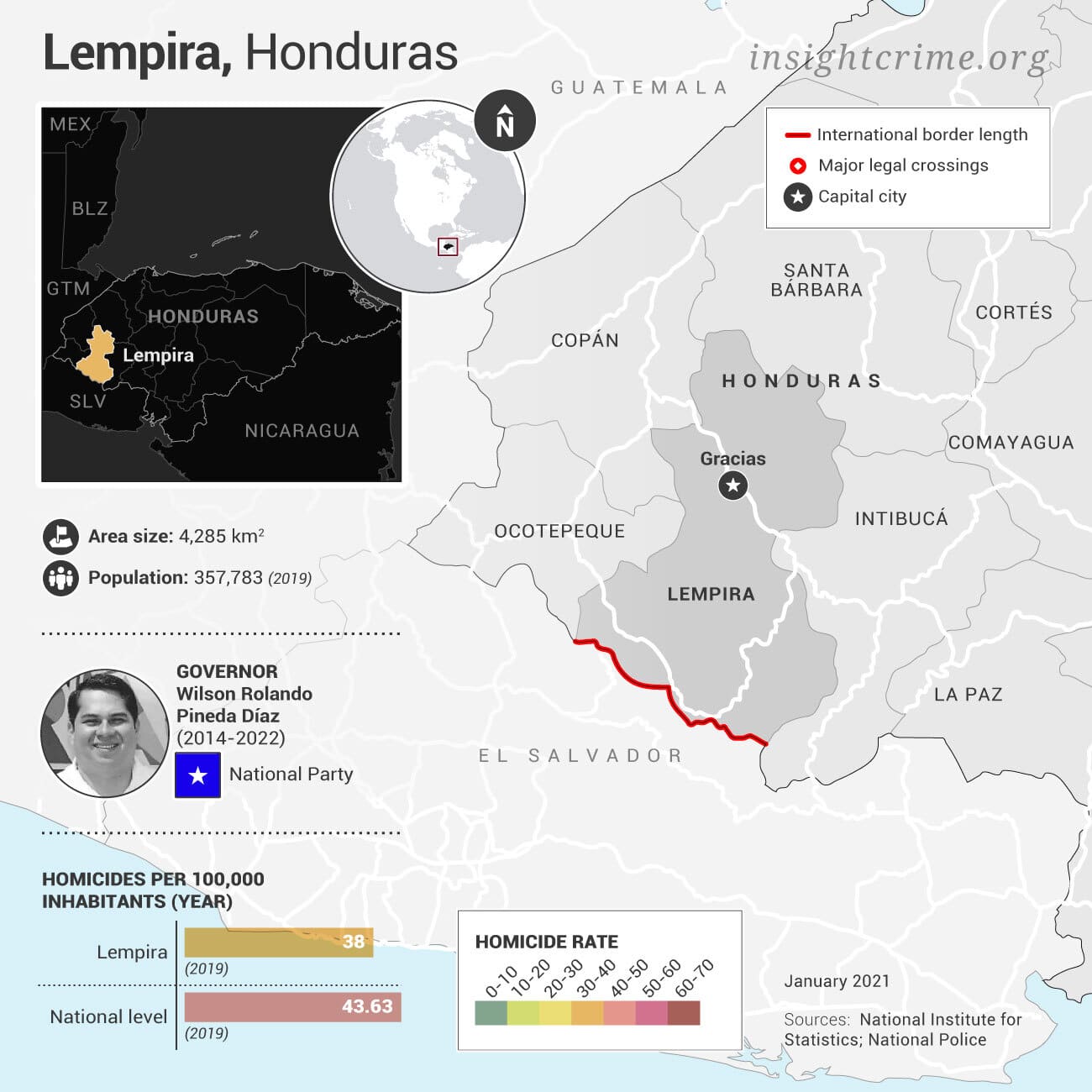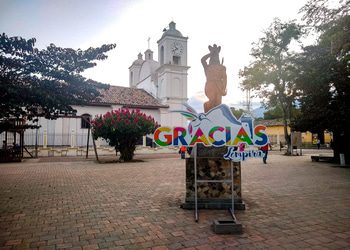Lempira is not a major hub for organized criminal activity but is nonetheless an important transit point for illicit narcotics and a political power center for National Party politicians involved in cocaine trafficking. Most notable in this regard was the president’s brother and former Lempira congressman, Juan Antonio “Tony” Hernández. In 2014, authorities discovered a sophisticated drug production facility in rural Lempira, allegedly owned by Tony, which housed cannabis plants, coca, and the only poppy crops that the Honduran government has detected in the country. Hernández was found guilty of drug trafficking in a US trial in 2019.
The presence of prominent National Party officials with links to the narcotics underworld, in addition to the existence of a virtually unused airstrip allegedly used as a cocaine drop-off point, suggests that Lempira is a transit point for cocaine shipments bound for the US.
The department also houses a lucrative human smuggling economy, operated by so-called “coyotes” –individuals who charge migrants thousands of dollars to be transported to the US.


Criminal Actors
Corrupt Politicians: Lempira, and in particular Gracias, is a political power center for the incumbent Honduran National Party, many of whose members are linked to cocaine trafficking. Honduran President Juan Orlando Hernández (JOH) and his brother, Tony, are from Gracias and formerly served as congressmen for Lempira. Tony was convicted on drug trafficking charges in the US in October 2019, and during his trial, US prosecutors alleged that JOH had received millions of dollars in drug money bribes. The current mayor of Gracias, Javier Antonio Enamorado, was Tony’s partner, according to information that Tony gave to US authorities upon his arrest in Miami in November 2019. The exact extent to which Lempira has been used as a transit route for cocaine is unclear. There is, however, ample evidence suggesting that Tony served as a middleman between the drug trafficking underworld and the National Party, first as a party member and then as Lempira congressman. In 2014, authorities discovered a sophisticated drug lab, allegedly owned by Tony, in the La Iguala municipality. The facility housed marijuana, coca, and poppy crops, along with equipment for processing cocaine. The department’s capital, Gracias, is strategically located on a highway connecting Tegucigalpa with the Copán department – a notorious drug trafficking corridor bordering Guatemala. Moreover, there is a government-built airstrip on the outskirts of Gracias, which is not used for commercial flights and is allegedly a cocaine drop-off point.
Mara Salvatrucha (MS13): The gang appears to have minimal presence in Lempira. Gang members from El Salvador – possibly from the MS13 – are known to seek refuge in rural areas of Lempira when under pressure from Salvadoran authorities. However, there is no indication that an identifiable MS13 cell operates in Lempira.
Barrio 18: Members of the Barrio 18 street gang have been trying to establish a presence in neighborhoods on the outskirts of Gracias. Some members have been arrested, but so far, the gang has been unable to get a foothold in the municipality. Honduran gang members (both Barrio 18 and MS13) purportedly use rural areas of Lempira as a refuge from authorities, as well as site for drug dealing.
Criminal Economies
Arms Trafficking: The presence of criminal actors in Lempira, such as gangs and drug traffickers, is weaker than in other parts of Honduras, and in turn the demand for illicit firearms is lower. Homicides are often committed with a firearm, though it is not clear what percentage of these are illegally owned.
Cocaine: Lempira appears to be a transit point for cocaine shipments travelling towards Honduras’ western border with Guatemala, as well as an operational hub for prominent National Party members involved in cocaine trafficking. A number of the department’s former officials have been accused or convicted of large-scale cocaine trafficking by US authorities – including the former Lempira congressman, Tony Hernández, and the former vice-mayor of Gracias, Mario Cálix Hernández (both National Party). In addition, there is a government-owned airstrip on the outskirts of Gracias which local sources say is solely used for military flights, some of which allegedly are used for cocaine shipments bound for the US.
Cannabis: Production and consumption of cannabis in Lempira is relatively low. In 2019, Honduran authorities only seized 20 kilograms of cannabis and eradicated 42 plants. Crops are grown by families in rural villages, typically in mountainous areas where the police does not maintain a strong presence. The produce is sold both in rural and urban areas. The MS13 and Barrio 18 street gangs have so far been unable to get a foothold in the local marijuana trade.
Human Smuggling: Lempira is an important transit point for migrants that enter Honduras through its southern borders, and exit it via the western border with Guatemala, in the department of Ocotepeque. In 2019, some 4,000 migrants returned to Lempira after being deported from the United States or Mexico. Given the price of hiring a smuggler from the area (roughly $8,000), this appears to be a lucrative criminal economy, reaching into the tens of millions.
Extortion: In comparison with the national average, there were minimal reported extortion cases in Lempira between 2008 and 2016. In fact, Lempira has one of the lowest incidences of extortion in Honduras. Cases appear to be isolated: only four extortion complaints were reported to Lempira police in 2019. It appears that neither Barrio 18 nor the MS13 have managed to set up extortion rackets within the department. However, small-scale extortion rackets are operated by individuals, some of whom pretend to be gang members.
Murder-for-hire: In October 2018, police arrested Marcio Geovanny Vásquez Quintanilla on charges of assassination and theft in the Lepaera municipality. Vásquez Quintanilla was one of Honduras’ most wanted criminals and was allegedly part of a criminal group being investigated for contracted killings. In October 2017, three men were arrested in Talgua in connection to the same criminal group, known as “Los Vásquez Quintanilla”.
Sources: This profile is based on one fieldtrip to Gracias (Lempira) and three field trips to Tegucigalpa during which InSight Crime interviewed representatives of the Attorney General’s Office, representatives of the Mission Against Corruption and Impunity in Honduras (MACCIH), military officers, national and local police officers –including the police officer who found the drug laboratory in 2014–, migration officers, local politicians, authorities working in Gracias’ town hall, and local journalists most of whom requested anonymity. InSight Crime also drew from information provided by the Honduran National Police, the Honduran National Institute for Statistics, and the local press.

